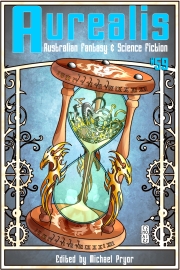“Tiresias: A ‘blood-punk’ fantasy” by Emmet O’Cuana
“A Brilliant Fire” by Douglas Fry
Reviewed by Dave Truesdale
Emmet O’Cuana’s “Tiresias: A ‘blood-punk’ fantasy” is a dark delight. The setting — an alternate history where Bram Stoker has written not of the vampires we have come to know, but of a mechanical, sort-of steampunkish related contraption of tubes and pumping mechanisms designed to replace or replenish worn-out blood, but at the price of making the user addicted to the new blood — is oddball enough to capture and hold reader interest.
Eddie Rialto is the last fully human left in Dublin, all others having relented and allowed themselves to be enslaved to the euphoria provided by the Vulcan machines in recompense for the constant recycling of their old blood now used as an energy source for mankind. The kicker is that Eddie’s father is head of the company making and selling the machines, and Eddie wants nothing to do with them or his father.
The author adroitly blends in the needed background information, touching on how society has been changed by this insidious new invention; how the rich seem to come out ahead (the haves vs. the have-nots), some political and societal musings, etc., and in sum gives a tightly constructed but well-rounded (for a short story of maybe 6,000 words) view of this noir, rather Dickensian alternate history where vampirism has been shape-shifted into yet another creatively reimagined iteration.
Douglas Fry’s quite short “A Brilliant Fire” is another well written alternate history, this piece set in post WWII Australia. A reporter from a paper titled The Weekender has come to interview reclusive and critically acclaimed author Gerard Dawson, whose new tome, The Northern Fires, is receiving a lot of press. The book recounts events surrounding the use of nuclear weapons by the Australians in ‘44 in northwestern Australia in order to reclaim the land from the invading Japanese, and how the aboriginals still despise the white man for destroying their people and poisoning their lands.
This scenario is (my inference) a transposition of actual events during WWII when the Americans, in order to shorten the war and save estimated tens of thousands of American lives, nuked Nagasaki and Hiroshima. But Fry takes the scenario a bit further in his alternate history. After author Dawson relates the awfulness of the Australian nuclear bombings as regrettable but more or less necessary (the Real Life American pov re Hiroshima and Nagasaki), he then goes on to tell the newspaper interviewer (referring to the Americans), “What I will say, though, is that the bombing of Hiroshima and Kyoto was abhorrent. Overkill, well and truly. The Japanese were done for by 46, no question there. Senseless destruction. Senseless.”
So once again the Americans are portrayed in a poor light–they’re the truly bad blokes. What we, the Australians did was necessary, but those bloody Yanks…
One cannot help but recall a similar politically motivated story, another rewriting of actual history, in Kim Stanley Robinson’s novelette “The Lucky Strike” (Universe 14, ed. Terry Carr, June 1984), where the author tries to make the case that the Hiroshima and Nagasaki bombings were totally unnecessary and a great Evil. In the present story, however, author Fry postulates Americans doing something they never did, and the Australians doing pretty much what the Americans did do in WWII, and which the author by fiat through the character of Dawson implies was necessary. Good grief. Both the Robinson and Fry stories evince overt political agendas, and that’s fine, authors enjoy the freedom to write whatever they wish. But readers and critics also enjoy the freedom to react in whatever fashion strikes them as appropriate upon reading a work of fiction. In this case, my reaction is one of resentment at the portrayal of Americans in this ill-conceived, shallow cheap-shot for something that never happened. While “The Brightest Fire” may be well written, as far as I am concerned it’s fictional lie can be written off.
Dave Truesdale has edited Tangent and now Tangent Online since 1993. It has been nominated for the Hugo Award four times, and the World Fantasy Award once. A former editor of the Bulletin of the Science Fiction & Fantasy Writers of America, he also served as a World Fantasy Award judge in 1998, and for several years wrote an original online column for The Magazine of Fantasy & Science Fiction. Now retired, he keeps close company with his SF/F library, the coffeepot, and old movie channels on TV.
